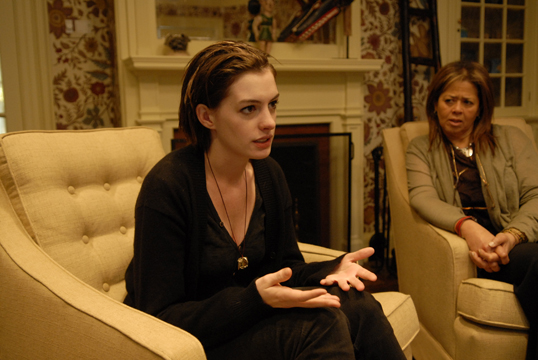 Anne Hathaway makes her sister’s wedding all about her (while Anna Deavere Smith looks on) in Rachel Getting Married.
Anne Hathaway makes her sister’s wedding all about her (while Anna Deavere Smith looks on) in Rachel Getting Married.
|
Rachel Getting Married
Starring Anne Hathaway and Rosemarie DeWitt. Directed by Jonathan Demme. Written by Jenny Lumet. Rated R. Opens Friday in Dallas, Nov. 7 at Modern Art Museum of Fort Worth.
|
|
A D V E R T I S E M E N T
|
|
|
|
A D V E R T I S E M E N T
|
|
The Member of the Wedding
Anne Hathaway is de-glammed and compelling in the worthy adult drama Rachel Getting Married.
By COLE WILLIAMS
Jonathan Demme has been making documentary movies for at least 20 years (Jimmy Carter: Man From Plains, The Agronomist), and his experience in nonfiction noticeably influences the narrative movies he does (The Silence of the Lambs). This is really easy to see in his latest drama, Rachel Getting Married.
Taken from a DELETE by newcomer Jenny Lumet, daughter of director Sidney Lumet (Before the Devil Knows You’re Dead), Rachel uses a style akin to home-video footage to capture the emotional story of a perilously dysfunctional family. Despite a few drawbacks, the movie succeeds as a good, simple drama, though it stops short of outstanding.
The film opens with Anne Hathaway, her hair cut shorter than we’re used to seeing it, smoking in front of an institution that we’ll come to learn is a rehabilitation facility. Her character, Kym, is on the way home to watch her sister, Rachel (Rosemarie DeWitt), get married and also to try to reconnect with her family. Hanging over the proceedings will be a tragedy from the past that keeps everyone on edge.
Kym is someone we all know too well: the damaged, mostly self-centered young person who tries to make amends with the people in her life but succeeds only in making them crazy, accidentally mentioning her sister’s past battles with bulimia and offering a wedding party toast that is one of the most awkward and uncomfortable moments I’ve seen in a movie.
Here, the filmmakers have toned down Hathaway’s glamour, focusing viewers’ attention on her acting skills. The actress (The Devil Wears Prada, Get Smart) does well enough, conveying curiosity, exuberance, and pain merely by using her big eyes and relying as much on timing as timbre in delivering her dialogue.
But therein lies the problem. The movie seems to be as much about Hathaway’s acting chops as the characters and plot, which is sort of distracting and may make the savvy moviegoer think, “Oh, great. More Oscar bait.” Seems that to be taken seriously in Hollywood these days, a pretty actress has to take a “fabuless” role: Halle Berry in Monster’s Ball, Charlize Theron in Monster, Hilary Swank in both Boys Don’t Cry and Million Dollar Baby. To Hathaway’s credit, she argues her case for a little golden man effectively.
As Rachel, DeWitt also is pretty great, trying to forgive and love her screwy sister while harboring anger at the trouble she always seems to bring, whether it’s insisting on being given the maid of honor role over Rachel’s best friend Emma or being confronted with lies she made up during a rehab exercise.
The actors playing Kym’s close family members, notably Debra Winger and Bill Irwin, are also excellent, genuinely conveying ordinary people who are somewhat messed up but who keep trying to do the right thing. In other words, they’re like the people in our own families. Along with the main family members, the rest of Rachel’s and her fiancé’s friends and family form the kind of motley assortment of folks you’d find at any wedding.
The only semi-novel aspect of this drama is the way its shot: via shakeycam. The technique — used mostly in action flicks — ups the intimacy here and parallels the story’s rawness. But, in the intensely emotional scenes, a traditional camera style would have worked much better, since the hand-held camera technique can be quite dizzying. Traditional camerawork would have let viewers concentrate on the important parts: the exchanges between characters. That, combined with some scenes that go on way too long — most egregiously, the wedding’s after-party — slow the film down. But give director Demme credit for trying to put a new spin on the type of movie that has become as dependable as the summer blockbuster: the Oscar entry.
 Email this Article...
Email this Article...

